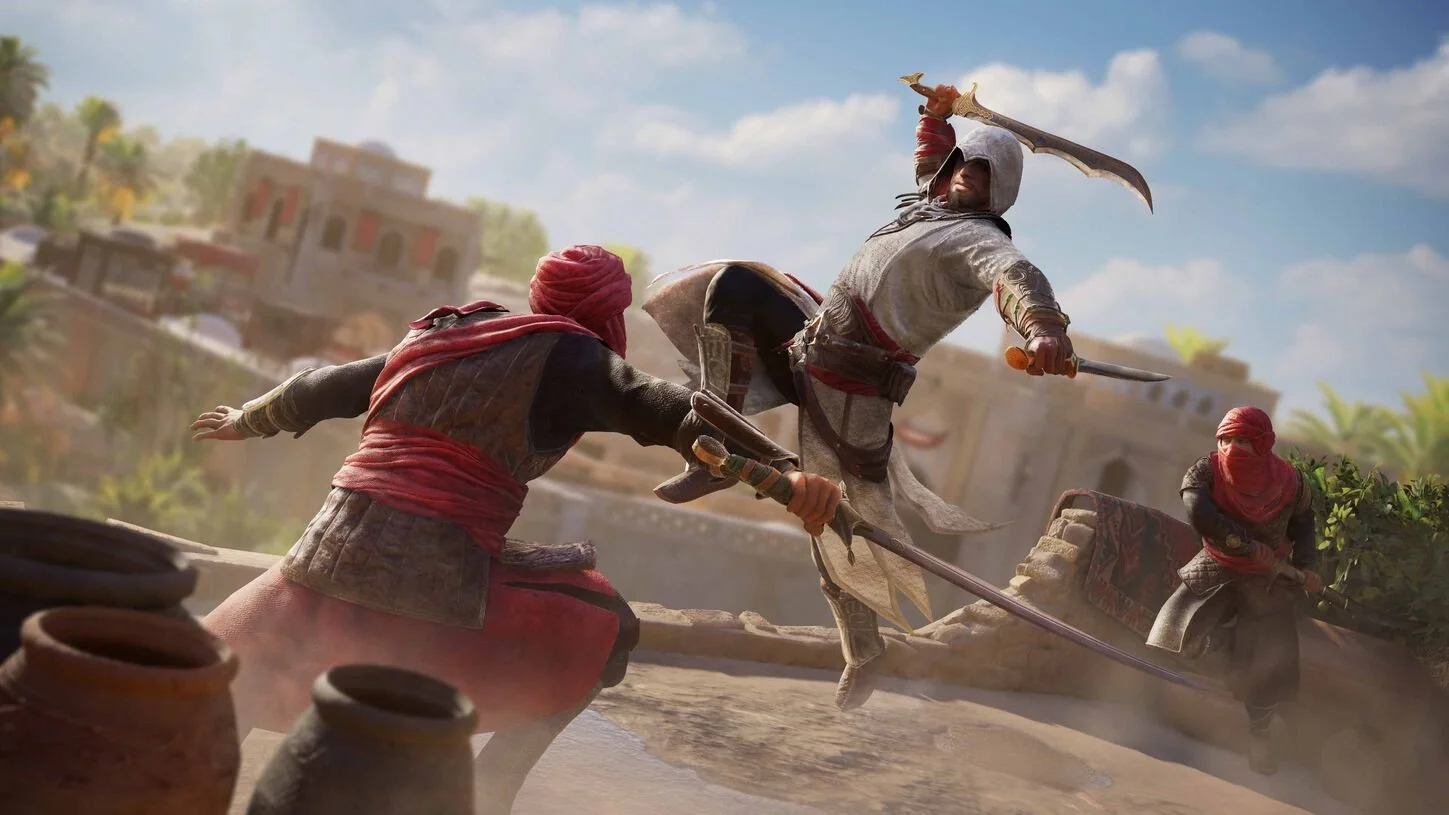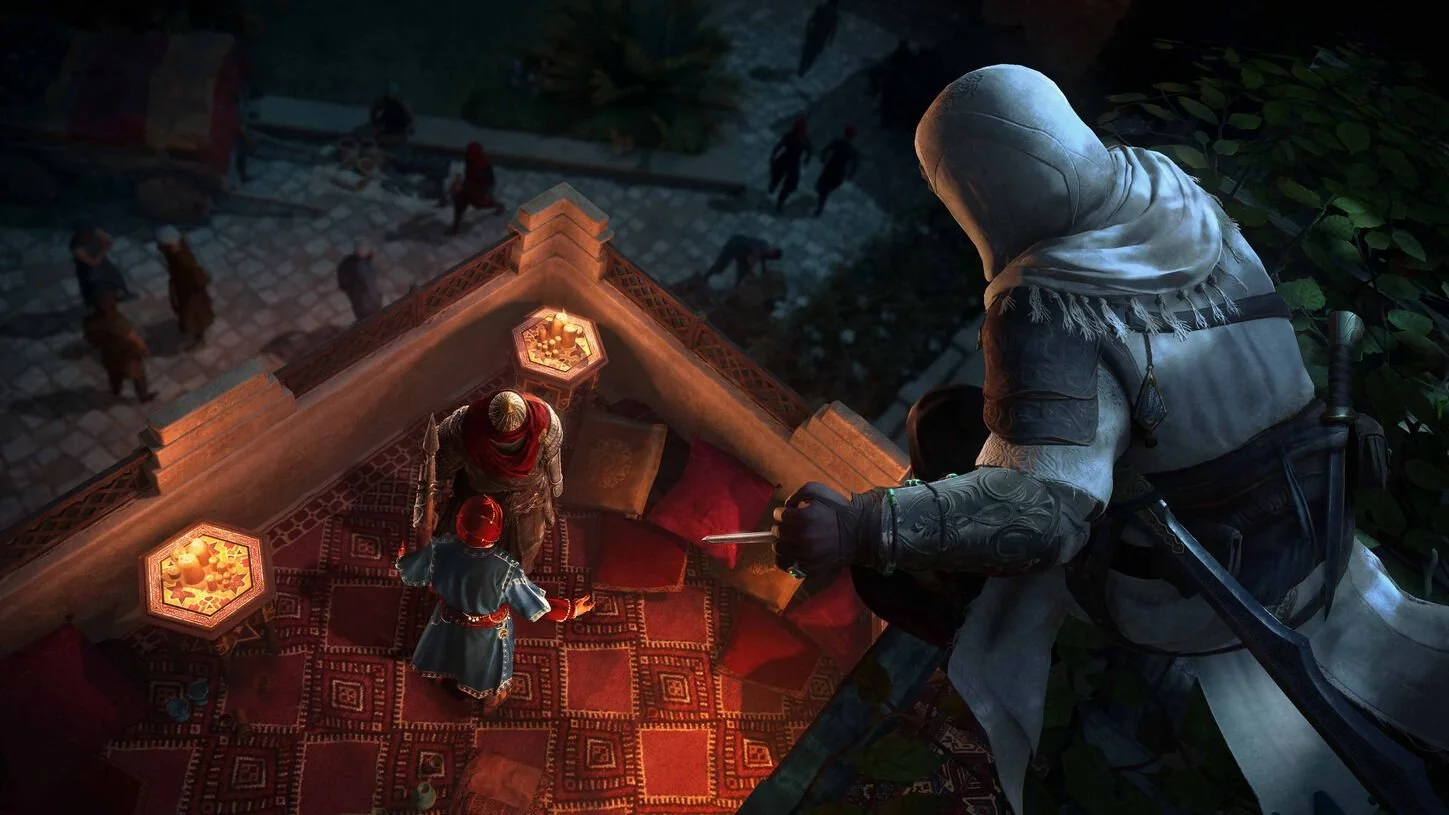Assassin’s Creed Mirage Review
“Master of None” Written by: Ethan (@ChaoticAether)
Assassin’s Creed is a rather important franchise to me despite my lack of enthusiasm for it in recent years. The original games starring Altair and Ezio played a huge part in my childhood, and even though I have fallen out of love with the franchise and its more recent RPG lite roots, I’ve still made it a habit to play the most recent entry whenever I get the chance to. I finally got around to Valhalla this year, and despite its likable cast and interesting enough story, the stat-based gameplay and 100 hour run time made me fully accept that I just don’t gel with the franchise’s current formula.
So when I discovered Assassin’s Creed Mirage was going back to its roots and focusing on the stealth action gameplay the series was originally known for, I was overjoyed. Basim was one of the more interesting parts of Valhalla, and returning to a Middle Eastern setting like Baghdad felt like an awesome way to celebrate 15 years of the franchise. It quickly rose to one of my most anticipated games, solely for the dopamine kick of nostalgia I was expecting to receive. Unfortunately, that never fully happened.
Assassin’s Creed Mirage is a messy game, one which I think has a dozen excellent ideas and mechanics. It brings stealth and parkour back to a series that has been sorely missing it for over eight years, and the world of Baghdad is a joy to explore. But it’s all surrounded by a forgettable story, terrible dialogue and a gameplay loop that fails to balance the line of old and new. Is it still worth a try though for old and new fans alike? Let’s dive in.
Image Credit: Ubisoft
Assassin’s Creed Mirage takes place in the 9th Century Baghdad, around 12 years before the events of Assassin’s Creed Valhalla. You play as a street thief called Basim, a man in his early 20s haunted by the visions of a Jinn in his dreams. While trying to prove himself to the Hidden Ones, Basim attempts to steal an Isu artifact from the Order of the Ancients, which results in the death of the Caliph and many of Basim’s allies. Blaming the events on his friend Nehal, Basim flees and eventually ends up joining the Hidden Ones, and returns to Baghdad years later to free its people from the Order, and to learn the truth behind both the artifact and his recurrent nightmares.
The story from there is very similar to the first game: hunting down the identities of the Order members one by one, and then killing them in a final large mission before repeating the process a further four times. This loop honestly makes the whole story feel barebones and emotionless. There is betrayal and death similar to older entries, but the narrative doesn’t even try to attach you to any of its characters as they often exit as quickly as they are introduced. Characters like Nehal and your assassin mentor Roshan may chime in from time to time, and they are often the highlight throughout the game's roughly 12 hour playtime, but there’s never anything interesting or important actually happening to keep you invested.
The same can sadly be said for the games overarching narrative as well. In Assassin’s Creed 1, I could often forgive the barebones narratives found within sequences as I really enjoyed the overarching narratives of Altair and Desmond, but there is nothing like that for Basim as a character, or for his goals. The story beats brought up in Valhalla are barely touched by the game's end, and the overarching narrative is next to non-existent, even for an Assassin’s Creed game. There are constant mentions of Basim’s struggles with the Creed that are never actually shown in the game, and other than the predictable ending, he’s frankly a blank slate for the majority of the run time.
It’s honestly disappointing, as I really felt there was potential for a narrative focusing on Basim and exploring his origins as an Assassin, but what we got instead is possibly one of the more boring protagonists we’ve had in the 15 year history of the series. There are some standouts though. Roshan is probably my favorite character the entire game, and there are a few additional charming allies you meet along the way, but even their inclusions can’t save what I personally believe to be an extremely weak narrative from start to finish.
Image Credit: Ubisoft
Despite my lack of enthusiasm surrounding the narrative, there’s plenty to like when it comes to Assassin’s Creed Mirage’s gameplay. Mirage returns to the stealth based roots of Assassin’s Creed, and has removed the destiny-esque stat based loot I’ve grown to despise so much over the past decade. Instead, your hidden blade is back to a one stab kill, and your overall rank is based solely on story progress. I find this to be a welcome addition, and have even found that venturing into higher leveled areas is easily doable which was an almost impossible feat in the last few games. Gone are the days of half damaging enemies with stealth attacks or enemies two levels higher being near invincible; you finally feel like an assassin again! Well, unless you've been detected and rushed into combat, as although the game now includes a perry mechanic, the swordplay feels just as spongy as Valhalla. Enemies still do not react to getting hit, large enemies still require upwards of half a dozen parries or attacks to kill; it all just feels miserable.
The same can be said for the game’s evasion systems, which at times can feel utterly broken. I have had enemies lose me instantly, enemies chase me for miles and everything in between. This inconsistency makes it feel like a chore, as it's sometimes just as quick to run outside their radius than it is to parkour on the streets and hide out of sight. Parkour also unfortunately keeps the feel of the more modern titles and is nowhere near the heights of Unity or even Syndicate. There are some things I think the team nailed though.
One of those is a set of tools that can be used like in past games and they are all surprisingly fun to use. I personally leaned heavily on throwing knife headshots, but from smoke bombs to noise makers, there’s plenty to choose from. They also have a nifty upgrade system that has you choosing one of many upgrades at each tier, allowing you to specialize your tools to your playstyle. The same can be said for customisation mechanics and outfits, which are all based on collectibles and story progress and provide slight buffs depending on the outfit. I wasn’t a huge fan of most of the selection, but I much prefer this system of unlocks than the more recent approaches found in Odyssey and Valhalla.
Image Credit: Ubisoft
When it comes to the game's missions they all return back to similar ideas and objectives found in the classic formula; for better or worse. Trailing missions are back, along with the following and protecting npc missions which are still a chore to play. Restricted areas and stealth are still a blast to play and the AI feels pretty balanced this time around, but again these feel identical to older games and will not present a challenge to veterans whatsoever. A surprising and welcome return though are the open ended assassination missions seen in Unity. These Hitman-lite levels allow you to use your environment to solve your mission, and often have multiple ways of dealing with the same target. I really like this approach, as it allows you to actually think and create a plan, rather than just following a marker on the minimap in a more linear format. I just wish they expanded more upon them, as these again feel like they have just been ripped out of a prior game.
My main issue with the missions of Mirage is that they have seemingly taken every old mission concept, both good and bad, and shoved them in without trying to innovate or make them their own. Many of these missions remind me of the worst parts of old Assassin’s Creed, and I feel Ubisoft should have used this game to innovate on the old formula rather than solely copy what came before. Many might see this as a positive, but they leave me a tad disappointed that the team didn’t use this as an opportunity to use these mechanics in new ways.
If there is one place where Mirage stands out it has to be its presentation, especially when it comes to the city of Baghdad itself. The world is beautifully realized, and the attention to detail is stunning. You can really tell the team put a lot of love into the game world and its ambience which really shows in the final product. The same can be said for their love of the franchise, as all the nods to prior titles, especially the Assassin’s Creed 1 style filter found within the menus, are a lovely touch. The soundtrack and vocal performances feel pretty standard when it comes to AC titles. The soundtrack suits the game world and story rather well, but are pretty forgettable after first listen. The same is true for the vocal performances. Some like Roshan and Basim shine brighter than others, but I feel like most of the performers do the best they can with such a forgettable story and script, and fit the game world and setting well.
Image Credit: Ubisoft
Summary
Assassin’s Creed Mirage feels like it lacks its own identity, which makes sense when you know it was originally intended to be a DLC add-on for Valhalla. It’s trying so hard to recapture the joy of the original games, but does so without trying to improve what came before and feels stagnant in the process. Baghdad is a wonderful map, but the lack of anything bar a dozen contracts and a handful of collectibles makes the game world feel empty. Tool upgrade systems, the return of stealth and customisation options are brilliantly handled, but the lack of difficulty throughout the game makes it all feel pointless. Returning to the Middle East and using Basim as your protagonist is inspired from a lore perspective, but the lack of an interesting story and painful dialogue make the main quest a chore to play through.
I’m honestly hesitant on Assassin’s Creed Mirage. If you are a die-hard fan of the franchise or really like the sound of a game that imitates the original Assassin’s Creed of 2007 in a modern day outing, you might find something worthwhile here. I don’t hate the game or regret buying it, but I really wish it innovated on the old formula more and created new gameplay scenarios instead of only doing what has been done in prior entries. Mirage feels like it ticked a checklist of things it needed to do to be an old-school Assassin’s Creed game, but it lacks the story and a spark of innovation that made the original games so special. Assassin’s Creed Mirage is a jack of all trades, but a master of none.





